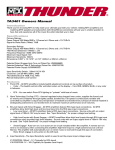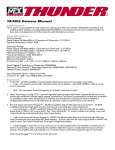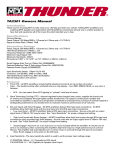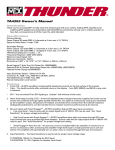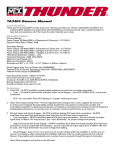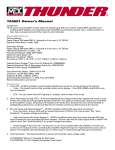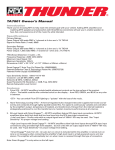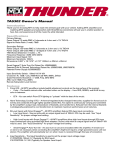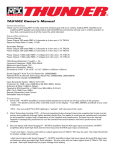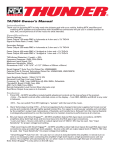Download MTX Thunder 564 Owner`s manual
Transcript
POWER AMPLIFIER OWNER’S MANUAL POWER AMPLIFIER OWNER’S MANUAL ENGLISH Introduction CONGRATULATIONS... HOW TO USE THIS MANUAL on your purchase of a new MTX Audio Thunder Amplifier! MTX has long been the industry leader in mobile enclosures and speakers, and we have reached new heights with the development of the new MTX Thunder amplifiers. You couldn’t have chosen a more reliable, powerful, or better performing amplifier. In fact, we back up every Thunder amplifier with a three-year warranty if installed by an authorized MTX Audio retailer (see the warranty statement). If you are installing this amplifier yourself, we recommend that you read the manual cover-to-cover before you install it. Familiarize yourself with the features and details on the input and output panels. Make sure you have all the equipment you need. Then follow the step-by-step installation instructions included. Sample installation diagrams may be found on our website: Your new MTX Thunder amplifier was designed, built and thoroughly tested at our stateof-the-art electronics manufacturing facility. We manufacture every amplifier using the latest Intelligent Surface Mount Technology. Some of the advantages of the new design are its significant improvements to the amplifier’s electrical and mechanical properties. ISMT devices feature substantially shorter internal and external lead lengths. This reduces stray capacitance and inductance, which results in cleaner and more accurate musical reproduction with significantly less noise interference. The ISMT mounter produces amplifier boards with smaller and lighter components, which are more resistant to vibrations inherent in the automotive environment. A word about power ratings. It is important for you to know how they stack up. MTX has chosen the most honest, most conservative way to rate our amps. We show you the RMS power, at 12.5 volts, and dynamic power at 14.4 volts. However, we go above and beyond the call of duty. We test each amplifier. The technician records the “actual” power output, and records this number on your Certified Performance Certificate. The amplifier must meet or exceed the rated specification before we’ll ship it. No questions. No exceptions. We want to ensure you get continuous high performance from your MTX Thunder amplifier, so we recommend that you have it professionally installed by your authorized MTX dealer. 2 Features mtx.com • Thunder Amplifiers are Covered by 1 or More of the Following United States of America Patents: #5,598,325, #5,631,608, #5,783,970. • Acoustically Seamless Turn-On/Turn-Off • Adjustable Input Sensitivity • Anti-Shock PCB Mounting Design • High Powered Transformer • Intelligent Surface Mount Technology • Nickel-Plated, Heavy Duty Terminal Block Connectors • Patented PWM MOSFET Switching Power Supply • Real Time Computerized Protection Circuit • Unique Rubber Insulated Iso-Feet™ • 12dB/Octave Stereo High Pass, 24dB/Octave Mono Low Pass Crossover • Bridgeable Circuit Design • Buffered RCA Output for Daisy-Chaining Multiple Amplifiers • Input Select Switch Functions as a Built-In Y Connector • Non-Faded Summed RCA Output • Patented Class A 100% Discrete Driver Circuit Topology • Patented Pure N-Channel Design • Thunder EQ Bass Enhancement If you have any questions, write or call us: MTX Audio 4545 E. Baseline Rd. Phoenix, AZ 85042 602-438-4545 • 800-CALL MTX [email protected] mtx.com Please take a moment to register your purchase on-line at mtx.com. Please also record the serial number of your amplifier in the space provided below and keep this manual for future reference, as well as your sales receipt as proof of ownership. (The serial number of your amplifier is marked on the bottom of its metal chassis.) SERIAL NUMBER: DATE OF PURCHASE: Specifications THUNDER564 THUNDER1004 • RMS Power measured at 12.5 Volts DC: 45 Watts x 4 into a 4 Ohm load with less than 0.3% Thd+N 90 Watts x 4 into a 2 Ohm load with less than 0.3% Thd+N 180 Watts x 2 bridged into a 4 Ohm load with less than 0.3% Thd+N • Dynamic Power measured at 14.4 Volts DC: 70 Watts x 4 into a 4 Ohm load 140 Watts x 4 into a 2 Ohm load 280 Watts x 2 bridged into a 4 Ohm load • Signal to Noise Ratio: ≥110dB A-Weighted • Damping Factor: >200 • Frequency Response: 20Hz-20kHz ± 0.25dB • Maximum Input: 8Vrms • Thunder EQ: Variable Bass Boost (0-18dB) centered at 40Hz • Crossover: Variable 40Hz to 200Hz, 12dB/Octave Stereo High Pass, 24dB/Octave Mono Low Pass, or Full Range • Dimensions: 13.9" x 9.75" x 2.1" (35.4cm x 24.8cm x 5.3cm) • RMS Power measured at 12.5 Volts DC: 90 Watts x 4 into a 4 Ohm load with less than 0.3% Thd+N 180 Watts x 4 into a 2 Ohm load with less than 0.3% Thd+N 360 Watts x 2 bridged into a 4 Ohm load with less than 0.3% Thd+N • Dynamic Power measured at 14.4 Volts DC: 125 Watts x 4 into a 4 Ohm load 250 Watts x 4 into a 2 Ohm load 500 Watts x 2 bridged into a 4 Ohm load • Signal to Noise Ratio: ≥110dB A-Weighted • Damping Factor: >200 • Frequency Response: 20Hz-20kHz ± 0.25dB • Maximum Input: 8Vrms • Thunder EQ: Variable Bass Boost (0-18dB) centered at 40Hz • Crossover: Variable 40Hz to 200Hz, 12dB/Octave Stereo High Pass, 24dB/Octave Mono Low Pass, or Full Range • Dimensions: 17.8" x 9.75" x 2.1" (45.3cm x 24.8cm x 5.3cm) THUNDER684 • RMS Power measured at 12.5 Volts DC: 60 Watts x 4 into a 4 Ohm load with less than 0.3% Thd+N 120 Watts x 4 into a 2 Ohm load with less than 0.3% Thd+N 240 Watts x 2 bridged into a 4 Ohm load with less than 0.3% Thd+N • Dynamic Power measured at 14.4 Volts DC: 85 Watts x 4 into a 4 Ohm load 170 Watts x 4 into a 2 Ohm load 340 Watts x 2 bridged into a 4 Ohm load • Signal to Noise Ratio: ≥110dB A-Weighted • Damping Factor: >200 • Frequency Response: 20Hz-20kHz ± 0.25dB • Maximum Input: 8Vrms • Thunder EQ: Variable Bass Boost (0-18dB) centered at 40Hz • Crossover: Variable 40Hz to 200Hz, 12dB/Octave Stereo High Pass, 24dB/Octave Mono Low Pass, or Full Range • Dimensions: 15.6" x 9.75" x 2.1" (39.7cm x 24.8cm x 5.3cm) 3 POWER AMPLIFIER OWNER’S MANUAL Installation Any deviation from the connection specifications recommended may cause serious damage to the amplifier, speakers and/or vehicle electrical system. Please double-check the connection before turning the system on. 1. Disconnect the vehicle’s negative battery connection. 2. Place your Thunder amplifier at the predetermined mounting location. Using a felt pen, mark the exact position of the mounting holes on the mounting surface. Set the amplifier aside. Use a sharp, precise blade to cut small circles in the carpet and padding around the four marks denoting your mounting holes to expose the metal underneath. Use a center punch to make an indentation in the metal to ensure that you drill the exact position for the screws. Drill the four holes as marked. 3. Temporarily mount your Thunder amplifier using the four (4) screws provided. 4. Run a power cable from the vehicle’s battery through the firewall and through the interior of the vehicle connecting one end to your Thunder amplifier’s +BATT terminal and connect the other end to the positive post on the battery. Note: Install a circuit breaker/fuse within 18" of the battery. This effectively lowers the risk of severe damage to your vehicle should a short circuit ever occur in the audio system. Do not install the fuse in the fuse holder until all installation steps have been completed. 5. Find a good ground spot on the vehicle’s chassis and remove the paint to reveal bare metal at the contact point. Attach the ground wire to that contact point and connect the other end of the ground wire to the GND terminal of your Thunder amplifier. 6. Connect a Remote Turn-on wire from your source unit to your Thunder amplifier’s REM terminal (14 or 16 gauge wire). If your source unit does not have a dedicated Remote Turn-on lead, you may connect to the source unit’s Power Antenna lead. 7. Connect RCA cables from your source unit to your Thunder amplifier’s RCA input jacks. If RCA (low level) output is not available, connect the included speaker (high level) connector to the speaker wires from the source unit. 8. Connect your speakers to your Thunder amplifier’s speaker terminals using 12 gauge minimum speaker cable. 9. Double-check all the previous installation steps, in particular, the wiring and component connections. Securely mount the amplifier. If everything is in order, reconnect the vehicle’s negative battery connection and begin adjusting your amplifier. Note: Be sure that the Gain Level on the amplifier is turned all the way down (counter clockwise) before proceeding with adjustments. Common Oversights • • • • 4 The battery ground should remain DISCONNECTED at all stages of installation. Do not begin drilling until you have put your Thunder amplifier aside. Using the amplifier as a drilling guide may cause irreparable damage to the amplifier and void your warranty. Do not route any wires underneath or outside the vehicle body. Route signal wires (RCAs from source unit, speaker wires, etc.) away from power wires (power, ground, etc.) to avoid ground loops and other sources of noise. Adjusting the Gain Typical Speaker Wiring Configurations 1. Turn the gain control on the amplifier all the way down. 2. Turn up the volume control on the source unit to approximately 3⁄4 of maximum. 3. Adjust the gain control on the amplifier until audible distortion occurs. 4. Adjust the gain control down until audible distortion disappears. 5. Follow steps 3-4 for other gain control settings if applicable. 6. The amplifier is now calibrated to the output of the source unit. Stereo Amplifier Bridge Mode Application Impedance Requirement 4 ohm bridge minimum 2 ohm stereo minimum 8 ohm 4 ohm 8 ohm 4 ohm + - - + L L R R + - - + L L R R AMP AMP Two 8 ohm Speakers Two 4 ohm Speakers OK not ok Troubleshooting Guide Read this if you wanna be a do-it-yourselfer or give us a call at 800-CALLMTX. PROBLEM CAUSE SOLUTION No LED indication No +12V at remote connection No +12V at Power connection Insufficient ground connection Blown power fuse Supply +12V to terminal Supply +12V to terminal Verify ground connection Replace fuse LED on, no output Volume on head unit off Speaker connections not made Gain control on amplifier off Signal processing units off All speakers blown Increase volume on head unit Make speaker connections Turn up gain Apply power to signal processor Replace speakers Output distorted Head unit volume set too high Amplifier gain set too high Lower head unit volume Lower amplifier gain Balance reversed Speakers wired L + R reversed RCA inputs reversed Wire speakers with correct orientation Reverse RCA input Some balance reversed Some Speakers wired L + R reversed Some RCA inputs reversed Wire speakers with correct orientation Reverse appropriate RCA inputs Bass is weak Speakers wired out of phase Not using MTX woofers Wire with correct phase Buy MTX woofers Blowing fuses Excessive output levels Amplifier defective Lower volume Return for service 5 POWER AMPLIFIER OWNER’S MANUAL 1. Gain Controls – These controls are used to match the input sensitivity of the amplifier to the particular source unit that you are using. The controls are factory set to 1Vrms. Note: The separate gain control for front and rear channels. Input Panel Layout 2. RCA Input Jacks – These RCA input jacks are for use with source units that have RCA or Line Level Outputs. An independent set of jacks are provided for front and rear stereo inputs. A source unit with a minimum level of 200mV is required for proper operation. The use of high quality twisted pair cables is recommended to decrease the possibility of radiated noise entering the system. 3. Input Select 2CH/4CH – This switch, is used to match the amplifier’s input to the source unit’s output so all four channels of the amplifier are driven. If your source unit has 2 outputs (a left and right) connect them to the amplifier’s front channel inputs, and place the input select switch in the 2CH position. If your source unit has 4 outputs, (left front, left rear, and right front, right rear) connect them to the amplifier inputs and place the input select switch in the 4CH position. In the 4CH position, the fader on your source unit will operate. ❶❻ ❹ ❺ 4. Frequency Control – This control is continuously adjustable from 40Hz through 200Hz. Factory setting is at 40Hz. ❸ ❷ ❼ ❷ ❺ ❹❻ ❶ ❸ ❷ ❼ ❷ ❺ ❹❻ ❶ ❸ ❷ ❼ ❷ ❺ ❹❻ ❶ 5. Crossover Select – This switch determines what type of signal comes out of the amp. If you select high pass, the crossover slope is 12dB/stereo. If you select low pass, your crossover slope will be 24dB/mono. Available crossover frequencies are 40-200Hz. 6. Thunder EQ – This equalization circuit is used to enhance the low frequency response of the vehicle’s interior. With up to 18 dB of boost and centered at 40Hz, the Bass EQ can be adjusted to meet your own personal taste. 7. RCA Output Jacks and Switch – These RCA outputs allow for a signal to be sent to other amplifiers in a daisy-chain configuration.. You can select whether the signal should be high pass , low pass or full range. In low pass mode, the RCA outputs allow for multiple bass amplifiers to be level controlled using one EBC. The RCA output jacks provide a line level full-range summed output of the Right Front/Right Rear and Left Front/Left Rear input signals. ❶ ❻❹ ❺ ❶ ❻❹ ❺ 6 7 POWER AMPLIFIER OWNER’S MANUAL 1. Fuses - For convenience, all amplifiers utilize ATC type fuses. For continued protection in the event that a fuse blows, replace the fuse only with the same value. Caution: The power fuses on the amp are for protecting the amp against overdrive. To protect the vehicle’s electrical system, an additional fuse is required within 18" of the battery on the 12V+ cable. Output Panel Layout Thunder564 - 25A x 3 Thunder684 - 35A x 3 Thunder1004 - 150 Amps (not supplied) ❺ 2. Power Terminal – This is the main power input for the amplifier and must be connected directly to the positive terminal of the car battery for the amplifier to operate properly. See the chart below for recommended cable sizes for each amplifier. Use caution when running this cable through the car. Try to avoid the input RCA cables, antenna cabling, or other sensitive equipment as the large amount of current flowing through this cable can induce noise into your system. It is also very important to have a tight connection to ensure maximum performance. ❶ ❷❹❸ Thunder564 – 6 - 8 Gauge Thunder684 – 6 - 8 Gauge Thunder1004 – 1/0 Gauge only 3. Ground Terminal – A good quality ground is required for your Thunder Amplifier to operate at peak performance. A short length of cable the same gauge as your power cable should be used to attach the ground terminal directly to the chassis of the car. Always scrape or sand any painted surfaces to expose bare metal where the ground wire will attach. ❺ 4. Remote Terminal – All Thunder Amplifiers can be turned on by applying 12 volts to this terminal. Typically this voltage is supplied by a wire from the source unit marked “remote” or “electric antenna”. ❶ 5. Speaker Terminals – As shown in the wiring diagrams, be sure to observe speaker polarity through the system. Failing to wire the speakers in proper phase could result in a loss of bass response and/or poor overall sound quality. Caution: Thunder amplifiers are not recommended for loads below 2 ohms stereo or 4 ohms bridged. ❷ ❹❸ 6. Power LED (top of heatsink)- A lighted LED indicates that power has been applied to the amplifier. +12V from the battery to the +BATT terminal and +12V from a switched ignition or remote lead from a head unit. An unlighted LED indicates power has been removed or the amplifier has overheated. In the case of the overheat condition, the amplifier will turn back on after it cools down. ❺ ❹ ❸ 8 ❷ 9 POWER AMPLIFIER OWNER’S MANUAL Warranty NOTES All MTX Audio Thunder Amplifiers purchased in the United States from an authorized MTX dealer are guaranteed against defects in material and workmanship for a period of three years from the date purchased by the end user if the product is installed by an authorized MTX dealer, and one year if installed by the consumer. This warranty is limited to the original retail purchaser of the product. Product found to be defective during that period will be repaired or replaced by MTX at no charge. This warranty is void if it is determined that unauthorized parties have attempted repairs or alterations of any nature. Warranty does not extend to cosmetics or finish. Before presuming a defect is present in the product, be certain that all related equipment and wiring is functioning properly. MTX disclaims any liability for other incurred damages resulting from product defects. Any expenses incurred in the removal and reinstallation of products are not covered by this warranty. MTX's total liability will not exceed the purchase price of the product. If a defect is present, your authorized MTX dealer may be able to effect repairs. Proof of purchase is required when requesting service, so please retain your sales receipt. and take a moment to register your warranty on-line @ www.mtx.com. For Warranty Inquiries, please call: 800-CALL MTX 602-438-4545 MTX Audio 4545 E. Baseline Rd. Phoenix, Arizona 85042 Register Warranty On-line: mtx.com 34 35 The Pointe at South Mountain 4545 East Baseline Road Phoenix, AZ 85042 602-438-4545 800-CALL MTX mtx.com © 2002 MTX. All rights reserved. MTX and Thunder are trademarks of MTX. Due to continual product development, all specifications are subject to change without notice. MTX001343 RevB 10/02 NDM251









